
Viscount Cobham is a title in the Peerage of Great Britain that was created in 1718. Owing to its special remainder, the title has passed through several families. Since 1889, it has been held by members of the Lyttelton family.

Earl of Rosslyn is a title in the Peerage of the United Kingdom. It was created in 1801 for Alexander Wedderburn, 1st Baron Loughborough, Lord Chancellor from 1793 to 1801, with special remainder to his nephew Sir James St Clair-Erskine, as Wedderburn had no surviving issue of his own. Wedderburn had already been created Baron Loughborough, of Loughborough in the County of Leicester, in the Peerage of Great Britain in 1780, with normal remainder to the heirs male of his body, and Baron Loughborough, of Loughborough in the County of Surrey, in the Peerage of Great Britain in 1795, with the same remainder as the earldom. The 1780 barony became extinct upon his death, but the 1795 barony and the earldom passed, by the special remainder, to his nephew, who thus became the second Earl of Rosslyn. The second Earl was a Lieutenant-General in the Army and also held political office as Lord Privy Seal and Lord President of the Council.

Earl of Chichester is a title that has been created three times, twice in the Peerage of England and once in the Peerage of the United Kingdom. The current title was created in the Peerage of the United Kingdom in 1801 for Thomas Pelham, 2nd Baron Pelham of Stanmer.

Earl of Lonsdale is a title that has been created twice in British history, firstly in the Peerage of Great Britain in 1784, and then in the Peerage of the United Kingdom in 1807, both times for members of the Lowther family.

Baron Northbrook, of Stratton in the County of Southampton, is a title in the Peerage of the United Kingdom. It was created in 1866 for the Liberal politician and former Chancellor of the Exchequer, Sir Francis Baring, 3rd Baronet. The holders of the barony represent the genealogically senior branch of the prominent Baring family. The name Northbrook is derived from a tithing of the local parish.

Baron Poltimore, of Poltimore in the County of Devon, is a title in the Peerage of the United Kingdom. It was created in 1831 for Sir George Bampfylde, 6th Baronet. His son, the second Baron, held office as Treasurer of the Household from 1872 to 1874 in the first Liberal administration of William Ewart Gladstone.

Baron Churston, of Churston Ferrers and Lupton in the County of Devon, is a title in the Peerage of the United Kingdom. It was created in 1858 for the former Conservative Member of Parliament, Sir John Yarde, 3rd Baronet. He had earlier represented South Devon in the House of Commons. Two years later, in 1860, he assumed by Royal licence the additional surname of Buller. As of 2023 the titles are held by his great-great-great-great-grandson, the sixth Baron, who succeeded his father in that year.
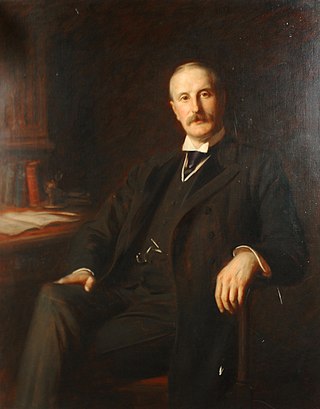
William Hood Walrond, 1st Baron Waleran,, known as Sir William Walrond, Bt, between 1889 and 1905, of Bradfield House, Uffculme, Devon, was a British Conservative Party politician who sat in the House of Commons from 1880 until 1906 when he was raised to the peerage. He served as Parliamentary Secretary to the Treasury between 1895 and 1902 and as Chancellor of the Duchy of Lancaster between 1902 and 1905.

Viscount Stonehaven, of Ury in the County of Kincardine, is a title in the Peerage of the United Kingdom. It was created on 27 June 1938 for the Conservative politician and former Governor General of Australia, John Baird, 1st Baron Stonehaven. He had already been created Baron Stonehaven, of Ury in the County of Kincardine, on 12 June 1925. The Baird Baronetcy of Urie, had been created on 8 March 1897 for his father Alexander Baird.

Baron Tredegar, of Tredegar in the County of Monmouth, was a title in the Peerage of the United Kingdom. It was created on 16 April 1859 for the Welsh politician Sir Charles Morgan, 3rd Baronet, who had earlier represented Brecon in Parliament. His eldest son, Charles Rodney Morgan, sat as Member of Parliament for Brecon, but predeceased his father. Lord Tredegar was therefore succeeded by his second son, the second Baron.
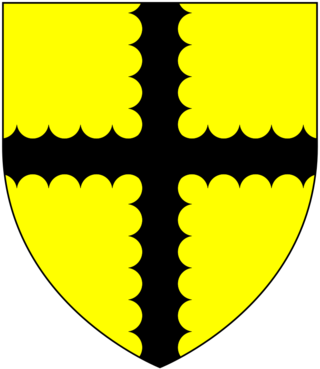
Baron Mohun of Okehampton was a title in the Peerage of England. It was created on 15 April 1628 for John Mohun, formerly a Member of Parliament for Grampound, Cornwall.
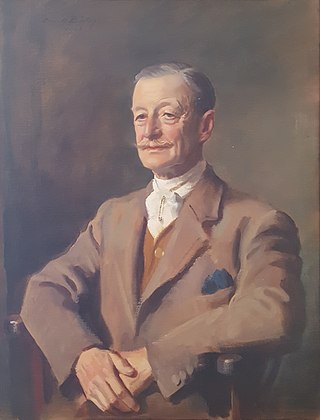
Lieutenant-Colonel Sir Gilbert John Acland-Troyte, of Huntsham Court, near Tiverton, Devon, was a British soldier and Conservative Party politician.

Charles Henry Rolle Hepburn-Stuart-Forbes-Trefusis, 20th Baron Clinton, styled The Honourable Charles Trefusis between 1832 and 1866, was a British Conservative politician. He served as Under-Secretary of State for India from 1867 to 1868.
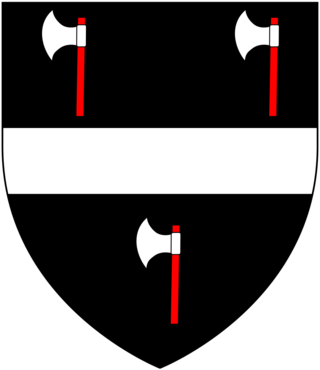
The Wrey Baronetcy, of Trebitch in the County of Cornwall, is a title in the Baronetage of England. It was created on 30 June 1628 for William Wrey (d.1636), 2nd son of John Wrey of Trebeigh, St Ive, Cornwall, a member of an ancient Devon family. The third Baronet was a supporter of the Royalist cause and sat as Member of Parliament for Lostwithiel after the Restoration. He married Lady Anne, third daughter and co-heir of Edward Bourchier, 4th Earl of Bath, and a co-heir to the barony of Fitzwarine. The fourth Baronet represented Liskeard and Devon in the House of Commons. The fifth Baronet was Member of Parliament for Camelford while the sixth Baronet represented Barnstaple.

The Honourable William Lionel Charles Walrond was a British Conservative politician. Did not die from wounds, but from illness while on sick leave in the UK.
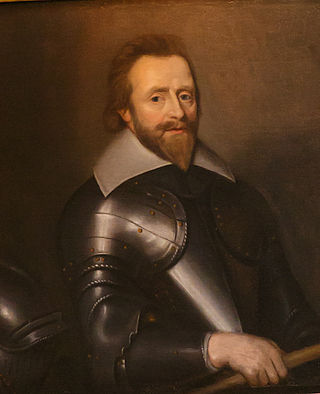
There have been two baronetcies created for members of the Coote family. The first is Coote of Castle Cuffe, while the second is Coote of Donnybrooke, both in the Baronetage of Ireland. As of 2020, the first creation is still extant. The holders of the first creation also held the title of Earl of Mountrath between 1660 and 1802.

Bradfield House is a Grade I listed country house situated in the parish of Uffculme, Devon, England, 2 miles (3.2 km) south-west of the village of Uffculme.

The Lyttelton family is a British aristocratic family. Over time, several members of the Lyttelton family were made knights, baronets and peers. Hereditary titles held by the Lyttelton family include the viscountcies of Cobham and Chandos, as well as the Lyttelton barony and Lyttelton baronetcy. Several other members of the family have also risen to prominence, particularly in the field of cricket.
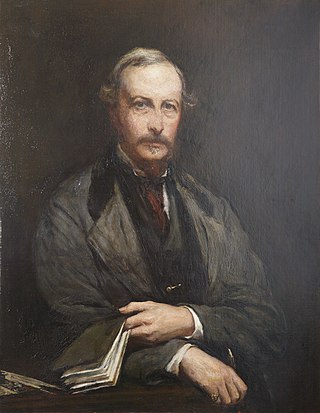
Sir John Walrond Walrond, 1st Baronet, of Bradfield House, Uffculme in Devon, was a British Conservative Party politician.

The Hood baronetcy, of Tidlake in the County of Surrey, was created in the Baronetage of the United Kingdom on 13 April 1809 for Admiral Samuel Hood (1762–1814). He was a younger son of Samuel Hood (1715–1805) of Kingsland in the parish of Netherbury, Dorset, a purser in the Royal Navy and first cousin of the 1st Viscount Hood and the 1st Viscount Bridport. The baronetcy was created with remainder to his nephew Alexander Hood (1793–1851) of Wootton House, Butleigh, Somerset, and the heirs male of his body.



















